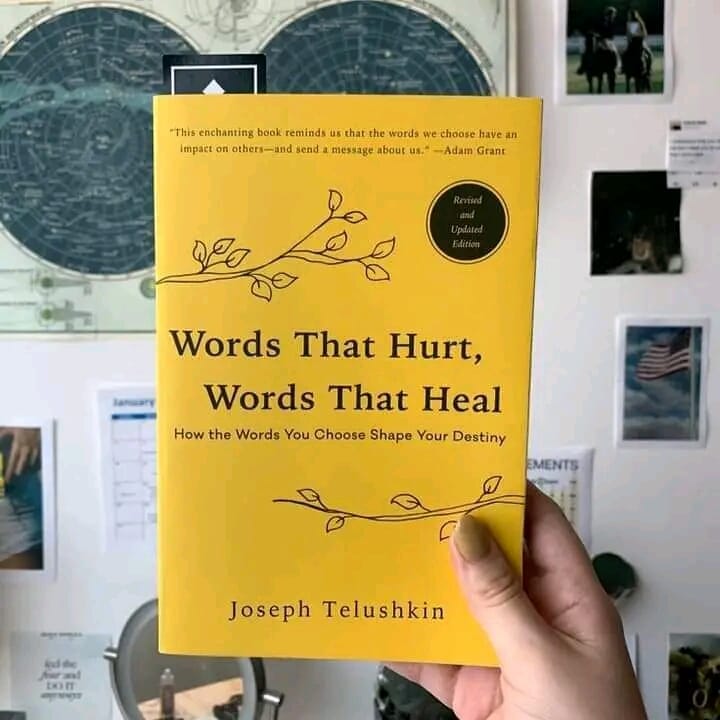The Power of Words: Words That Hurt, Words That Heal
Words carry immense power. They can uplift, encourage, and inspire, but they can also wound, demoralize, and leave lasting scars. The words we choose to speak and write can shape our relationships, influence our emotional well-being, and impact the course of our lives. Understanding the importance of words—both those that hurt and those that heal—is crucial for fostering empathy, communication, and emotional intelligence in our personal lives and in society as a whole.
Words That Hurt: The Impact of Negative Language
Words that hurt are often those that are harsh, critical, or dismissive. These words can range from outright insults to more subtle forms of emotional manipulation, such as sarcasm, criticism, or passive-aggression. While sometimes we might dismiss the impact of negative words, the truth is that they can be deeply damaging, especially when used in relationships or in a position of power.
Psychological Impact: Negative language can trigger emotional responses such as shame, guilt, and anger. It can reinforce feelings of inadequacy and self-doubt. For children, especially, words that hurt can become internalized, shaping their sense of self-worth and identity in harmful ways. In adults, repeated verbal abuse or harsh criticism can lead to depression, anxiety, and even post-traumatic stress.
Interpersonal Relationships: Words that hurt can erode trust and intimacy in relationships. In families, workplaces, or friendships, harsh words can create emotional distance, sow resentment, and even lead to the breakdown of communication. When words are used to control or belittle others, the relationship dynamic shifts from one of mutual respect to one of dominance and submission.
Cultural and Societal Impact: On a larger scale, harmful language can perpetuate harmful stereotypes, foster division, and fuel prejudice. Hate speech, discriminatory language, and the use of derogatory terms all contribute to the marginalization of specific groups and the perpetuation of inequality. Language that demeans others also makes it harder to foster inclusivity, understanding, and acceptance in diverse societies.
Words That Heal: The Transformative Power of Positive Language
On the flip side, words that heal can be transformative. Healing language is empathetic, kind, and supportive. It creates a space for understanding, connection, and growth. Whether used in personal interactions or in the broader context of social discourse, healing words have the power to mend emotional wounds and promote mental well-being.
Emotional Healing: Kind words, genuine compliments, and supportive affirmations can help individuals rebuild their sense of self-worth and confidence. When someone is struggling, words of encouragement or empathy can be a lifeline, offering comfort and strength. Research has shown that positive affirmations and self-talk can improve mental health outcomes by boosting mood and reducing stress.
Restoring Relationships: Healing words can repair fractured relationships. An apology, for example, can be one of the most powerful tools for healing. When we acknowledge the pain we’ve caused and take responsibility for our words and actions, we open the door to reconciliation. In families and friendships, saying “I’m sorry” or “I understand how you feel” can go a long way toward rebuilding trust and communication.
Fostering Compassion and Understanding: Words that heal encourage empathy and compassion. They help us understand others’ perspectives and feelings, creating a culture of respect. For example, in times of loss or grief, words of sympathy can offer comfort and show that we care. Even simple phrases like “I’m here for you” or “You are not alone” can offer tremendous emotional support and remind someone that they are valued.
Social Healing: On a broader level, healing language can help to mend societal rifts. In times of social tension, whether in the wake of political conflict or social unrest, words that promote dialogue, mutual understanding, and compromise are essential for reconciliation. Leaders and activists who use language that encourages unity and respect can help bridge divides and promote collective healing.
The Importance of Mindful Communication
Understanding the profound impact words can have encourages us to be more mindful of the language we use. Whether we are speaking to a loved one, a colleague, or a stranger, our words have the potential to either uplift or hurt. Mindful communication involves being aware of how our words might affect others and choosing language that is thoughtful, respectful, and compassionate.
Active Listening: Effective communication is not just about speaking carefully but also listening actively. When we listen with empathy and attentiveness, we create an environment where others feel heard and understood. This kind of listening fosters connection and trust, which are key elements in healing emotional wounds.
Constructive Feedback: When criticism is necessary, it’s important to deliver it in a way that is constructive and non-judgmental. Rather than simply pointing out flaws, we can offer solutions and encouragement for improvement. This approach helps individuals grow while maintaining their dignity and sense of self-worth.
Language as a Tool for Change: The language we use also shapes the way we see the world and the way we relate to others. By choosing words that emphasize inclusivity, respect, and kindness, we can contribute to building a more compassionate and just society. Just as harmful language can perpetuate cycles of division, healing language can pave the way for transformation and positive change.
Conclusion
In the end, the words we use have the power to heal or harm, to build or destroy. By becoming more conscious of our language and choosing words that uplift, encourage, and empower, we can create a world where empathy and understanding thrive. While it’s impossible to undo the pain caused by hurtful words, it’s always possible to start using words that heal, building stronger, more supportive connections with those around us and contributing to a culture of kindness and respect.
